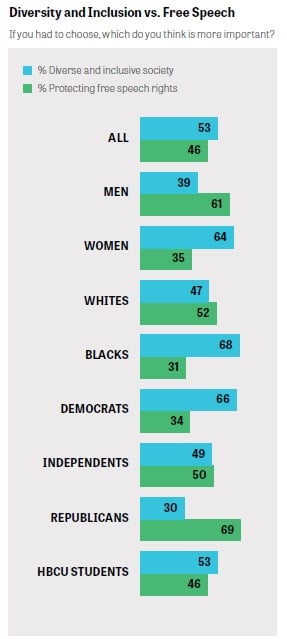You have /5 articles left.
Sign up for a free account or log in.

iStock
College students value a diverse and inclusive environment more than free speech rights, according to a new study on student attitudes on free expression.
The report from Gallup and the Knight Foundation comes at a turbulent time on college campuses nationwide, where students have challenged the principles of the First Amendment -- they have called for controversial campus speakers to be disinvited, and when they disagree with speakers’ message, have shouted them down. They’ve also called for administrators to invest more in diversity initiatives and are demanding clear statements from them against speech they deem hateful.
Asked to select which is more important, about 53 percent of the students interviewed for the study picked diversity, versus 46 percent who chose free speech. This data is based on telephone interviews with 3,014 traditional-age students (18 to 24) at 100 four-year institutions, both public and private.
When the authors broke down the data further, they provided a clear picture of what certain campus demographics prioritize. About 61 percent of men favored free speech rights far more than a diverse and inclusive campus (39 percent). Conversely, 64 percent of women believe that diversity is more important, versus 35 percent who picked free speech.
Differences emerge with race, too. White students tended to value free speech more -- 52 percent compared to 47 percent who picked diversity and inclusion. About 68 percent of black students, meanwhile, said diversity was more important compared to 31 percent for free speech.
 “We are seeing increasingly diverse campuses, much more diverse than they would have been a generation ago,” said Sam Gill, the Knight Foundation’s vice president for communities and impact.
“We are seeing increasingly diverse campuses, much more diverse than they would have been a generation ago,” said Sam Gill, the Knight Foundation’s vice president for communities and impact.
Thus, Gill said, universities and their leaders are finding themselves adjusting to the demands of contemporary students -- creating new jobs and offices that fill students’ calls for diversity.
The foundation and Gallup (which partners with Inside Higher Ed in sponsoring events and publishing other reports) conducted a similar survey in 2016 and found similar results, though in this round they found students continue to skew more in favor of protecting diversity than free speech.
For instance, in 2016, about 22 percent of students reported wanting “a positive environment” if it meant certain speech, even that which is hateful but legally protected, was prohibited. In this year’s study, that number rose seven percentage points.
But what was most striking to Brandon Busteed, executive director of Gallup’s higher education division, was how much students appeared to be critical of social media, despite its proliferation in their lives.
Roughly 57 percent of students thought that debate on political and social issues took place online rather than in person at their colleges (43 percent).
Despite the popularity of online platforms, though, students reported social media tended to stifle free speech in many ways. About 60 percent of students indicated that too many people block others online with whom they disagree -- this is up 12 percentage points from 2016.
About 59 percent of students said people feared being attacked online for their views, an uptick of 10 percentage points from 2016. And 83 percent of students said that it is too easy for anonymous users to post online.
Colleges have struggled to compete as the forum for debate and discussion in a digital age, when the conversation has turned online, Busteed said. Institutions must reclaim the debates and create productive campus talks, he said.
Busteed noted that campuses don’t always successfully publicize some of these initiatives. As his survey notes, students aren’t always aware of the campus opportunities or policies (such as whether a campus speech code exists).
“If we’re really embracing it, we’ve got to communicate what we’re doing,” he said.
Previous research into students’ beliefs on free expression found even when they respected the ideals of the First Amendment in theory, they did not always want to follow them in practice. Students also were unsure of the protections the First Amendment offered, with many believing that it did not allow for hate speech (even though it often does).
This also came through in the Gallup/Knight report, with 64 percent of students believing that the First Amendment shouldn’t protect hate speech. About 70 percent of students said that campuses should restrict certain slurs, and 30 percent believe they should prohibit some politically oriented speech.
Gill said that while students should learn about the intricacies of the constitution and receive a civic education, more importantly, students “are taking to a new level” the debate around the First Amendment. Over time, exceptions have been added to free speech law -- fighting words, not being able to shout “fire” in a crowded theater -- and he said he believes this generation will be at the forefront of conversations around this evolving issue.
“There is a much more profound conversation going on about how free expression figures into our democracy,” Gill said. We’re going to have a much more educated group lead into that conversation. We’re talking societywide about the strength of our democracy, and this is a huge opportunity for universities to show leadership in addition to having to react to challenging situations.”




